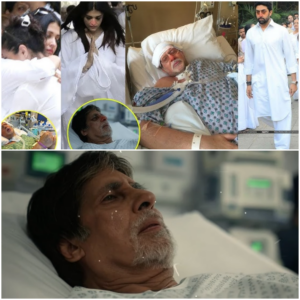Shocking! Deepika Padukone Tried to Comit Su*cide in Depression after Dua Padukone
.
.
.
Clarification of Misinformation Regarding Deepika Padukone and Her Mental Health Journey
In recent days, several inaccurate reports and misleading headlines have been circulating about Deepika Padukone, the renowned Bollywood actress, concerning her personal struggles with mental health. While Deepika has been incredibly open and honest about her past battles with depression, some of the stories that have surfaced in the media have misrepresented the details of her journey, causing confusion and misunderstanding among the public.
Deepika’s story has been one of resilience, courage, and advocacy for mental health awareness. However, some of the recent coverage has distorted the facts surrounding her experience with depression. It’s crucial to address these inaccuracies in order to respect her journey and prevent further misrepresentation of sensitive topics like mental health.
Deepika’s Mental Health Journey: The Truth Behind the Headlines
Deepika Padukone’s candidness about her struggle with depression has made a significant impact in raising awareness about mental health in India and beyond. In 2014, she made headlines when she publicly shared her battle with depression, shedding light on an issue that is often ignored or stigmatized, especially in countries like India, where mental health is still a taboo subject.
During her interview, Deepika recalled how, despite having everything she could ever want—a successful career in Bollywood, fame, and fortune—she felt an overwhelming sense of emptiness and despair. In 2014, she experienced a physical collapse that led her to realize she had been struggling with depression for some time. What many people did not know at the time was that she had been silently battling anxiety and depression, without ever expressing her feelings to those around her.
The breakthrough moment came when Deepika fainted during a routine press conference. This was a wake-up call for her, and after being diagnosed with depression, she was encouraged to seek professional help. Deepika has spoken openly about how this was the turning point in her life. It was the moment she realized she needed to prioritize her mental health and take proactive steps to recover.
Deepika’s decision to go public with her story was not an easy one. However, she felt it was important to share her experiences to break the stigma surrounding mental health and to show others that they were not alone in their struggles. She acknowledged the fear of being judged but stressed that speaking up about mental health had made a huge difference in her life. It empowered her to take control of her recovery and has since inspired countless others to seek help as well.
The Distortion of Facts
While Deepika’s decision to share her personal journey was empowering, some of the recent reports about her life have misinterpreted the details of her struggles. One of the most concerning points is the misrepresentation that she “attempted suicide” during her battle with depression. This claim, which has been falsely circulated in various media outlets, does not reflect Deepika’s narrative or the message she has been trying to convey.
In fact, what Deepika shared was the profound sense of hopelessness and despair she felt during her darkest moments, but she never explicitly stated that she had ever attempted to take her own life. She spoke candidly about how, during one of her lowest points, she felt like she didn’t want to live anymore. This is an experience that many people struggling with depression can relate to, but it is important to note that feeling suicidal or hopeless is not the same as attempting suicide.
Deepika’s message was never about glorifying or sensationalizing suicide; rather, she focused on the importance of seeking help, recognizing the signs of depression, and breaking the silence around mental health. Unfortunately, some media outlets have sensationalized her story, focusing on the more extreme interpretations of her experience rather than the overall message of hope, recovery, and the need for open conversations about mental health.
The Role of Family Support in Deepika’s Recovery
Another important aspect of Deepika’s journey that has been misrepresented in some media reports is the role of her family, particularly her mother, in her recovery. Deepika has frequently acknowledged the importance of family support during her battle with depression. In one of her interviews, she recalled a pivotal moment when she was living alone in Mumbai and felt overwhelmed by her mental health struggles. Her mother, who had come to visit her in the city, noticed that Deepika was not herself and encouraged her to seek professional help.
This moment of intervention was crucial for Deepika, as it allowed her to take the first step toward recovery. She described how her mother’s recognition of the signs of her depression was a turning point in her life. Deepika also spoke about how her mother’s support gave her the courage to open up about her feelings and begin therapy. It was through this process that Deepika began to find relief and started her healing journey.
Her story emphasizes the importance of family support when dealing with mental health issues. It’s a reminder that having someone in your corner who understands and cares about your well-being can make all the difference in the world. Deepika’s experience demonstrates that even in the midst of success and fame, anyone can suffer from mental health struggles, and it’s okay to ask for help.
The Stigma of Mental Health in India
One of the central themes of Deepika’s advocacy is the stigma surrounding mental health in India and many other parts of the world. For years, mental health issues were seen as a sign of weakness or something to be hidden, especially in cultures where there is pressure to maintain an image of success, happiness, and stability. Deepika has been instrumental in breaking down these barriers, showing the public that mental health is just as important as physical health and should not be ignored or downplayed.
In India, where there is still a lack of understanding and awareness about mental health, Deepika’s willingness to speak out about her struggles has sparked much-needed conversations. Her openness has encouraged many people to seek help and seek out mental health resources, which can be life-changing. Furthermore, her advocacy for mental health has helped to normalize conversations about anxiety, depression, and other conditions, offering support to those who may feel isolated or ashamed of their struggles.
The Importance of Accurate Reporting on Mental Health
With the recent circulation of misinformation, it’s important to address the responsibility of the media in accurately reporting on mental health issues. The portrayal of mental health struggles in the media can have a significant impact on how people perceive their own challenges and how they seek help. When misinformation is spread, it can reinforce harmful stereotypes and create confusion about the realities of living with mental illness.
Deepika has always been an advocate for responsible reporting and has made it clear that she wants to use her platform to shed light on the importance of mental health awareness, rather than sensationalizing her own experiences. She hopes that her story will continue to inspire others to speak out about their struggles and, more importantly, to seek the help they need to heal.
Conclusion: Moving Forward with Awareness and Empathy
In conclusion, it is important to correct the misinformation that has been circulating regarding Deepika Padukone’s mental health journey. Her battle with depression is not just a personal story but a message to the world that mental health matters. Through her bravery in speaking up, she has helped millions understand that it is okay to not be okay and that reaching out for help is the first step toward healing.
As a society, we must work together to eliminate the stigma surrounding mental health and encourage open, honest conversations. We must also be mindful of how we report and consume information about mental health, ensuring that we present an accurate and empathetic portrayal of the challenges people face. Deepika’s story is a testament to the power of vulnerability, the strength of seeking support, and the hope that lies in healing.
Let us take this opportunity to reflect on our own mental health, support others in their struggles, and commit to building a more understanding and compassionate world where mental well-being is prioritized, not stigmatized.
News
Tamanna Bhatia shares early morning bedroom moment with husband Salman Khan in Maldives
Tamanna Bhatia shares early morning bedroom moment with husband Salman Khan in Maldives . . . Tamanna Bhatia Shares Early Morning Bedroom Moment with Husband Salman Khan in Maldives: A New Chapter in Their Love Story After facing multiple heartbreaks…
Tamanna Bhatia FIRST RASOI delicious dish impressed to husband Salman Khan after wedding
Tamanna Bhatia FIRST RASOI delicious dish impressed to husband Salman Khan after wedding . . . Tamanna Bhatia’s First Culinary Experience in the Khan Family: A Heartwarming Gesture Towards Husband Salman Khan Tamanna Bhatia, the beautiful and talented actress who…
Very Sad News for Aishwarya Rai as Amitabh Bachchan Pass was in critical condition at hospital!
Very Sad News for Aishwarya Rai as Amitabh Bachchan Pass was in critical condition at hospital! . . . Amitabh Bachchan’s Health Crisis: Fans Express Concern After Cryptic Social Media Post Bollywood legend Amitabh Bachchan, whose illustrious career has spanned…
Shocking! Hina Khan got Married to boyfriend Rocky Jaiwal after Recovering from her Stage 3 Cancer
Shocking! Hina Khan got Married to boyfriend Rocky Jaiwal after Recovering from her Stage 3 Cancer . . . Hina Khan and Rocky Jaiwal: A Journey of Love, Strength, and Resilience Leading to Their Upcoming Wedding Announcement In a heartwarming…
❤️🩹❣️ Deepika Padukone and Ranveer Singh with their adorable daughter in their latest photo!
❤️🩹❣️ Deepika Padukone and Ranveer Singh with their adorable daughter in their latest photo! . . . Deepika Padukone and Ranveer Singh Share Heartwarming Moment with Their Adorable Daughter in Latest Photo Bollywood’s power couple, Deepika Padukone and Ranveer Singh,…
SHOCK!!! Sad news for Deepika Padukone as Deepika Padukone Tried to Commit Su*cide in Depression at hospital!
Sad news for Deepika Padukone as Deepika Padukone Tried to Commit Su*cide in Depression at hospital! . . . Clarification Regarding Deepika Padukone’s Mental Health Struggles In recent reports, some misleading and sensationalized headlines have emerged, claiming that Deepika Padukone…
End of content
No more pages to load







